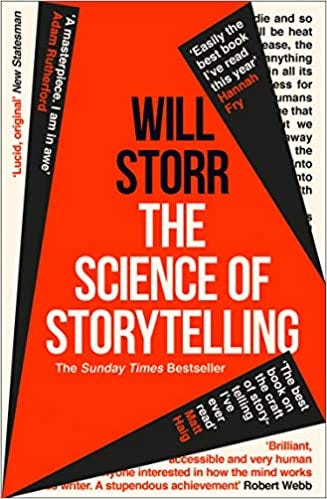Win A Copy Of A Book About Storytelling At A Time When We Could All Use A Good Story
I have five copies of Will Storr's "The Science Of Storytelling" To Give Away

Back at the beginning of this month — 10 years ago or so — I told paid Singal-Minded subscribers I would be pausing the newsletter during March because it was looking to be a particularly crazy month for me, work-wise.
Well, as it turned out it has a particularly crazy month for everyone, everything-wise. I hope you are all doing okay, given the circumstances, and when the newsletter ‘officially’ returns next month I’ll of course have some things to say about coronavirus (in short, I’m against it).
In the meantime, though, I didn’t want to let the present disaster or my hiatus prevent me from doing a book giveaway I’d been greatly looking forward to, for Will Storr’s The Science of Storytelling, which came out in the U.K. last year (it was a Sunday Times bestseller) and which just came out in the United States:
Stories shape who we are. They drive us to act out our dreams and ambitions and mold our beliefs. Storytelling is an essential part of what makes us human. So, how do master storytellers compel us? In The Science of Storytelling, award-winning writer and acclaimed teacher of creative writing Will Storr applies dazzling psychological research and cutting-edge neuroscience to our myths and archetypes to show how we can write better stories, revealing, among other things, how storytellers—and also our brains—create worlds by being attuned to moments of unexpected change.
I haven’t read this one yet — I have a copy waiting for me as soon as I finish up the aforementioned work craziness — but Storr’s last book, Selfie: How the West Became Self-Obsessed, was excellent, and ended up having a major impact on my own book-in-progress.
Storr was kind enough to answer a few questions for me over email, and I’ve pasted that mini-Q&A below. As for the giveaway itself: I have five (!) copies of The Science of Storytelling, one reserved for a paid subscriber and four available to free or paid subscribers. Just send an email with the subject line ‘story’ to singalminded@gmail.com by noon, Eastern time, on Wednesday, March 25th, and I’ll do the drawing on Thursday. (The books can only be shipped to U.S.-based winners, unfortunately.)
Stay safe, everyone — more from me soon.
What drew you to this subject?
Getting on 10 years ago I was researching my book The Unpersuadables (published in the UK as The Heretics) that asked the question, Why do smart people sometimes end up believing crazy things? For example, the historian David Irving is a demonstrably smart man and was once a respected historian. But then he somehow managed to convince himself that Hitler was a “friend of the Jews.” He became so convinced of his beliefs that he went to prison in their defence. The answer I hit upon was that the brain is a storyteller, and it’s most interested not in absolute truth, but in accepting facts that flatter its heroic narrative of self.
Whilst I was researching the science of this, I was also working on a novel, and reading some of the “how to” guides in the background. I realised the things they were saying about how to write novels and screenplays were often the same as the things the neuroscientists and psychologists I’d been interviewing had been saying about how the mind works. I just kind of continued on that path.
What's the elevator pitch for why people should read your book?
Well firstly, it’s definitely not just a “how to” book. It’s for anyone interested in the mind. My goal when writing it was, this just has to be entertaining in its own right. The really magical thing for me was realising that, actually, being able to use extracts from novels and films to explain sometimes complex ideas from neuroscience and psychology was incredibly useful. These writers had such a wonderfully intuitive sense about how people operate — what people get wrong and why they get it wrong — that it’s all there for you to find. You really can explain confabulation by talking about Citizen Kane, say. So this is really a book about how we’re all stories — and that’s not a cutesy TED Talk soundbite, it’s true. To see how it’s true you just need to flip it. You can say “the self is a story” but it’s equally true that “stories are a self.” Writers tell stories in the way that they do because we’re mimicking how human brains process human reality. They’re creating alternative consciouses that kind of sink into ours when we’re experiencing story.
Finally, it’s short. The older I get the more my heart sinks when I order a book and an 850 page slab arrives. Short books are the best books.
Of course everyone is now looking to make everything about coronavirus — you've just come out of a long period of obsessively researching and thinking and writing about storytelling. Has that changed how you view the way this nightmare has unfolded?
Well I guess it just confirms even more this idea that we experience the world in stories. When trouble strikes we enter crisis-struggle-resolution mode, the three acts of drama. It’s just beginning to feel like Act Two needs to hurry up and finish.

